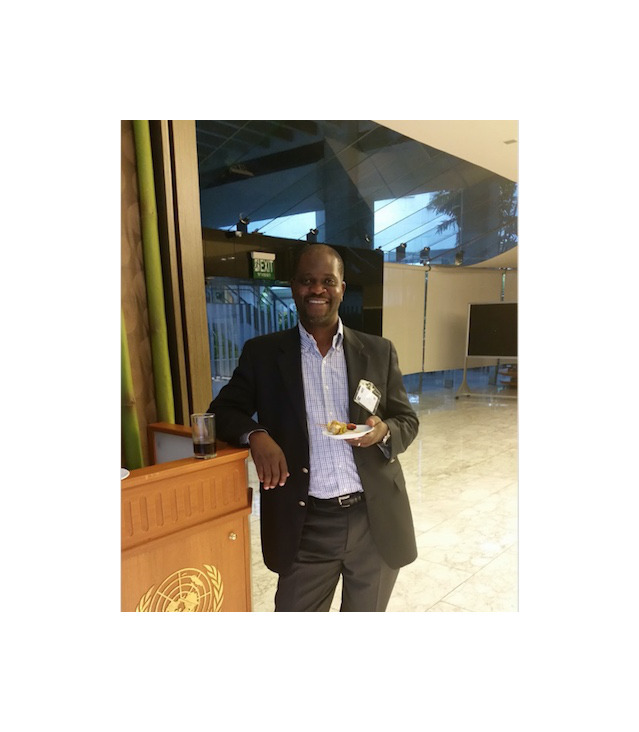Dr. Richard Mbatu started at USF St. Petersburg in 2014, the professor aims to inspire students to become active in different clubs and organizations that work to improve the environment no matter how small. Courtesy of Richard Mbatu
By James Bennett III
What do USF St. Petersburg and the United Nations have in common? Dr. Richard Mbatu.
In 2014, during Mbatu’s first year with the university, he caught the attention of the U.N.’s Tampa chapter.
The chapter was interested in Mbatu’s international background and specialization in environmental policy for an event that they were hosting.
Mbatu agreed to participate and kept in contact once the event had finished, using U.N. publications in his classes.
Four years later, Mbatu is entering his fifth year teaching at USF St. Petersburg and has been selected to help write the sixth Global Environment Outlook (GEO) report for the U.N.
The GEO started in 1997 by the United Nations Environment Programme and attempts to examine challenges to the world’s environment on both societal and global levels, assess environmental policies and tries to make predictions as to what may be in store for the Earth’s future.
Mbatu, whose work on the GEO will focus on today’s youth, believes that his collaboration with the U.N. is an opportunity to bring students’ views into the global arena.
Inversely, Mbatu also sees his work on the GEO as an opportunity to bring new resources to the university.
Working on the GEO has exposed Mbatu to the UN’s policy processes, the mechanisms of the organization, and insight into how international policy is formed. Furthermore, he has been given access to resources he can utilize in his classes.
“I’m not only using the report (in my classroom), now I’m one of the people that created the report,” said Mbatu.
It is important to Mbatu and the U.N. for young people across the globe to become engaged in the decision making process of environmental policy.
He wants young people to be informed before they become world leaders.
“The next director of the United Nations environment programme is a youth of today, so why not involve the youth? Get their perspective. Get their understanding. Get their world view and what they think or how they think we can join hands in resolving the problems of planet earth,” Mbatu said.
Mbatu hopes that his work on the report will expose students to the challenges that our environment faces and inspire them to make a change.
Students attending his classes may already be working on conservation.
Some of Mbatu’s classes have civic engagement components where students collaborate with various environmental organizations, applying the theoretical knowledge they gleaned at USF St. Petersburg toward positive change.
Students can make difference by joining student organizations on campus. Mbatu listed the sustainability club and Student Government as two effective outlets.
Eventually Mbatu would like to see a youth-led organization on campus that works on international environmental issues as well.
Unfortunately, he perceives student involvement with environmental activism on the decline and hopes that faculty members will help him bring on a resurgence by supporting students.
Of course, contrary to what some would like to believe, not every problem lives and dies by faculty hands.
Mbatu is also calling upon senior student leadership to begin grooming their successors for the challenges that lie ahead.
“Wherever you are involved, show that you are a child of the planet earth,” said Mbatu.
He would also like to see students become involved in a more practical sense.
Mbatu encourages a combination of theoretical methods, such as the ones he covers in class, and practical methods that everybody can implement.
Although you may not be involved in an organization bearing the labels “environment” or “sustainability,” Mbatu says that you can still contribute by reducing the harm you inflict upon the environment, even if that contribution is sending an email instead of printing a document.
Small changes such as going digital may seem insignificant at first but Mbatu promises that it can still make a huge difference.
One small action may inspire another, leading to a tidal wave of positive change. On the other hand, apathy could beget more apathy.
To individuals who have become discouraged, who feel that they are unable to make meaningful change and that it is too late to fight, Mbatu offers the view that conservation is comparable to a boxing match.
When a fighter goes into a boxing match, especially ones that seem like a lost cause, he must not enter the ring mentally defeated.
“It is inch by inch that we are going to achieve something,” said Mbatu. “It is in bits that we put things together to have a bigger picture.”



